News of the Week
Page 24

Page 25
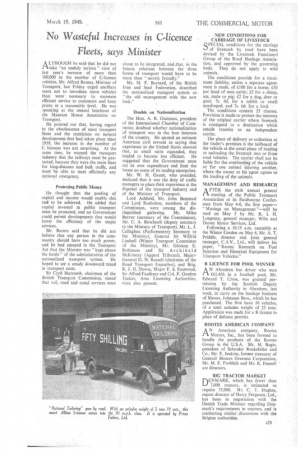
Page 26
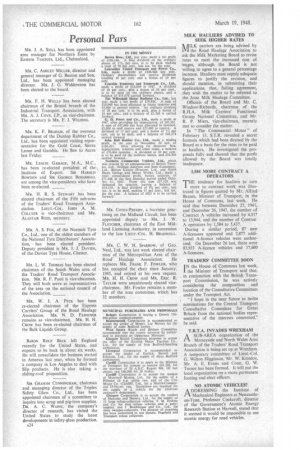
Page 27
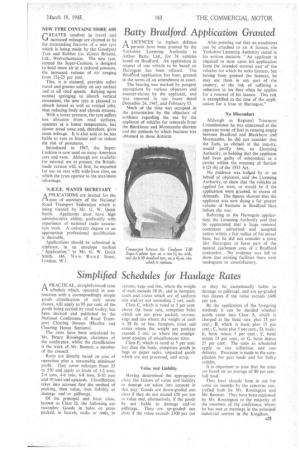
Page 28
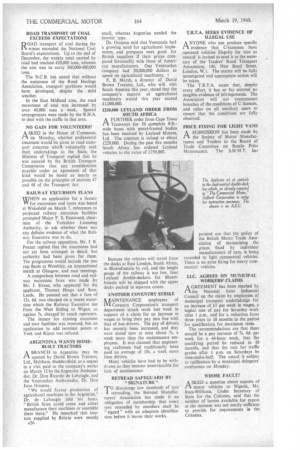
Page 29
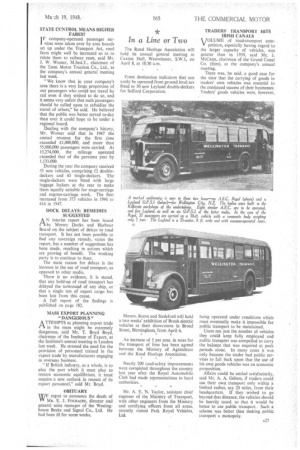
If you've noticed an error in this article please click here to report it so we can fix it.
Coach Fuel Chaos': M.O.T. Action
THE chaotic position which had arisen as the result of an undefined Ministry of Transport directive, imposing a 121 per cent. cut in fuel for tours and private hire, as compared with 1947, has now been partly relieved by a more specific statement. It follows action by the Passenger Vehicle Operators' Association.
In a letter dated March 15 and sent to the principal associations, the Ministry states that, subject to the required savings being made, the Transport Commissioners have been asked to give special consideration to the claims of those operators who:— (1) Have been authorized to run excursions and tours in 1948 which were not authorized in 1947.
(2) Were substantial operators of excursions and tours before the war. but who, for special reasons (vehicle; diverted to essential services, for instance), were unable to use a high proportion of their pre-war fleet in 1947 on their normal programme of licensed excursions and tours.
(3) Are new entrants. to privateparty work, or established operators who did little, if any, private-party work in 1947, where they had corn mitted themselves to embark upon such work before February 23, 1948, or where there is a genuine demand for such work in a district where such facilities, within a reasonable radius, do not exist.
This clears ,up a good deal of misunderstanding. Previously, the entire industry had been in the dark as to how the cuts were to take effect. Had they been purely arbitrary, greater hardship would have been caused to many operators than that already imposed by the reduction in operation.
A22 The position of the newcomer was not clear, as was pointed out to "The Commercial Motor" somewhat emphatically last week, by an operator who said that he had just been told at the Metropolitan Transport Commissioner's office that there was to be no petrol at all for new operators. A potential-newcomer acquaintance of his had been told only a few weeks previously that it was safe enough to go ahead and buy a vehicle. Now he was left with it on his hands.
The P.V.0,A, held a national council meeting on March 3, after receiving the Ministry's original letter about the cuts. It wanted to know why there was such a lack of uniformity among the Transport Commissioners as to the interpretation of the order. Was it to apply to all operators, municipalities included?
Vita! Questions What was the position of operators whose mileage had increased, in 1948, over that in 1947? What of operators who were affected by delay in deliveries? What was the position of those who had taken considerable bookings? Was the public to suffer as well as the operators? The question was also raised as to the relative weather conditions, this year and last, during the current period.
The Association said that until these matters, and indeed the whole system of levying the cuts were made clear, it could not afford maximum assistance to the Commissioners. Immediately it was in possession of all the facts, it would offer its willing assistance.
The Ministry's latest letter answers some of the questions. It remains to be seen what will be the attitude of the P.V.O.A. and other associations. Many cases must still clearly be decided on their merits, at the discretion of the Commissioners, but the principles should be made as clear as possible and should receive wide publicity. NEW CONDITIONS FOR CARRIAGE OF LIVESTOCK
SPECIAL conditions for the carriage of livestock by road have been devised by the Livestock Functional Group of the Road Haulage Association, and approved by the governing body. They do not apply to wild animals.
The conditions provide for a maximum liability, unless a separate agreement is made, of £100 for a horse; £50 per head of neat cattle; £5 for a sheep, ass, mule or pig; £2 for a dog, deer or goat; 7s. 6d. for a rabbit or small quadruped, and 7s. 6d. for a bird.
The conditions contain 25 clauses. Provision is made to protect the interests of the original carrier where livestock is consigned to a destination which entails transfer to an independent carrier.
The place of delivery or collection at the trader's premises is the tailboard of the vehicle at the usual place of loading or unloading the livestock into or from road vehicles. The carrier shall not be liable for the overloading of the vehicle or for one animal injuring another, where the owner or his agent agrees to the loading of the animals.
MANAGEMENT AND RESEARCH
A FTER the sixth annual general (1 meeting of the Public Transport Association at its Eastbourne Conference from May 4-6, the first paper" Musings on Management "—will be read on May 5 by Mr. R. I. H. Longman, general manager, Wilts and Dorset Motor Services, Ltd.
Following a 10.15 a.m, assembly at the Winter Garden on May 6, Mr. A. T, Priddle, director and joint general manager, C.A.V., Ltd., will deliver his paper, "Recent Research on Fuel Injection and Electrical Equipment for Transport Vehicles."
B LICENCE FOR POOL WINNER AN Aberdeen bus driver who won £61,456 in a football pool, Mr. Edward T. Cross, was granted permission by the Scottish Deputy Licensing Authority in Aberdeen. last week, to carry on the haulage business of Messrs. Johnston Bros., which he has purchased. The firm have 10 vehicles, of a total unladen weight of 25 tons. Application was made for a B licence in place of defence permits.
ROOTES AMERICAN COMPANY
AN American company, Rootes Motors, Inc., has been formed to handle the products of the Rootes Group in the U.S.A. Mr. M. Bogie, president of Schroder Rockefeller and Co., Mr. E. Jenkins, former treasurer of General Motors Overseas Corporation, Mr. M. E. Frohlich and Mr: R. Fennell are directors.
BIG TRACTOR MARKET
DENMARK, which has fewer than 7,000 tractors, is estimated to require 75,000., Mr. C. T. Hughes, export director of Harry Ferguson, Ltd., has been in negotiation with the Danish Trade Minister regarding Denmark's requirements in tractors, and is conducting similar, discussions with the Belgian authorities.
MILK HAULIERS ADVISED TO SEEK HIGHER RATES NAILK carriers are being advised by al the Road Haulage Association to ask the Milk Marketing Board to revise rates to meet the increased cost of 'wages, although the Board is not willing to agree to a general percentage increase. Hauliers must supply adequate figures to justify the revision, and should mention, in submitting their applications, that, failing agreement, they wish the matter to be referred to the Joint Milk Haulage Committee.
Officials of the Board and Mr. C. Windsor-Richards, chairman of the R.H.A. Milk Carriers' Functional Group National Committee, and Mr. R. P. Miers, vice-chairman, recently met to consider the matter.
In "The Commercial Motor" of February 13, S.T.R. revealed a secret formula which had been deyised b'y the Board as a basis for the rates to be paid to hauliers. He investigated the proposals fully and showed that the profit allowed by the Board was totally inadequate.
10584 MORE CONTRACT A OPERATORS riE tendency for hauliers to turn more to contract work was illustrated in figures quoted by Mr. Alfred Barnes, Minister of Transport, in the House of Commons, last week. lie said that between December 27, 1945, and December 26, 1947, the number of Contract A vehicles increased by 4,317 to 13,944, and the number of Contrac A operators by 1,584 to 5,437.
During a similar period, 87 new A-licensees appeared and 2,877 additional A-licence vehicles were authorized. On December 26 last, there were 83,933 A-licence vehicles and 17,600 A-licensees.
TRADERS' COMMITTEE SOON TN the House of Commons last week, I the Minister of Transport said that, in .conjunction with the British Transport Commission, he was actively considering the composition and location of the Consultative Committees under the Transport Act.
"I hope in the near future to invite nominations for the Central Transport Consultative Committee for Great Britain from the national bodies representative of the interests concerned," he said.
T.R.T.A. INVADES WREXHAM
ASUB-AREA organization of the Merseyside and North Wales Area Branch of the Traders' Road Transport Association is being set up at Wrexham. A temporary committee of Lieut.-Col. G. Wilton Higginson, Mr. W. Kintdon, Mr. A. E. Evans and Coun. G. W. Turner has been formed. It will put the local organization on a more permanent footing and elect officers.
NO ATOMIC VEHICLES?
A DDRESSING the Institute of 1-1 Mechanical Engineers at Newcastleon-Tyne, Professor Cockcroft, director of the Government's Atomic Energy Research Station at Harwell, stated that it seemed it would be impossible to use atomic energy for road vehicles.
NEW TYRE CONTAINS MORE AIR
GREATER comfort in travel and increased mileage are claimed to be the outstanding features of a new tyre which is being made by the Goodyear Tyre and Rubber Co. ((heat Britain). Ltd., Wolverhampton. The new tyre, termed the Super-Cushion, is designed to hold more air at a reduced pressure, the increased volume of air ranging from 12i-25 per cent.
This, it is claimed, provides softer travel and greater safety on any surface and at all road speeds. Relying upon normal springing to absorb vertical movement, the new tyre is planned to absorb Lateral as well as vertical jolts, thus reducing body and chassis stresses.
With a lower pressure, the tyre suffers less abrasion from road surfaces, operates at a lower temperature, has slower tread wear and, therefore, gives more mileage. It is also said to be less liable to cuts or bruises and to reduce the risk of punctures.
Introduced in 1947, the SuperCushion is now used on many American cars and vans. Although not available for internal use at present, the Britishmade version will, at first, be exported for use on cars with wide-base rims, on which the tyres operate to the maximum advantage.
N.R.T.F. WANTS SECRETARY
APPLICATIONS are invited for the post of secretary of the National Road Transport Federation which is being vacated by Mr. G. W. Quick Smith. Applicants must have high administrative ability, preferably with experience of national trade association work. A university degree or an appropriate professional qualification is desirable.
Applications should be submitted in triplicate, in an envelope marked "Application," to Mr. G. W. Quick Smith, 146, New Bond Street, London. W.1. ROAD TRANSPORT OF COAL EXCEEDS EXPECTATIONS
ROAD transport of coal during the winter exceeded the National Coal Board's expectations. Up to the end of December, the weekly total carried by road had reached 420,000 tons, whereas the aim was to carry 300,000-400,000 tons.
The N.C.B. has stated that without the assistance of the Road Haulage Association, transport problems would have developed, despite the mild weather.
In the East Midland area, the road movement of coal was increased by over 40,000 tons a week. Special arrangements were made by the R.H.A. to deal with the traffic in that area.
NO GAIN FOR VOLUNTEERS? A SKED in the House of Commons.
on Monday, whether preferential treatment would be given to road transport concerns which voluntarily sold their undertakings to the State, the Minister of Transport replied that he was assured by the British Transport Commission that any consideration payable under an agreement of that kind would be based as nearly as possible on the principles of sections 47 and 48 of the Transport Act.
RAILWAY EXCURSION PLANS WHEN an application for a licence W for excursions and tours was heard at Wakefield on March 7, references to projected railway excursion facilities prompted Major F. S. Eastwood, chairman of the Yorkshire Licensing Authority, to ask whether there was any definite evidence of what the Railway Executive was to do.
For the railway opposition, Mr. J. R. Penzer replied that the excursions had not yet been arranged in detail, but authority had been given for them. The programme would include the two cup finals at Wembley, an international match at Glasgow, and race meetings.
A comparison between road and railway excursion fares was made by Mr. J. Evans, who appeared for the applicant, Thomas Heaps and Sons, Leeds. He pointed out that a fare of 12s. 6d. was charged on a recent excursion which the Railway Executive ran from the West Riding to Wigan, as against 7s. charged by coach operators.
The licence for existing excursion and tour facilities was renewed, but an application to add terminal points at York and Ripon was refused.
ARGENTINA WANTS HOMEBUILT TRACTORS ABRANCH in Argentina may be opened by David Brown Tractors, Ltd., Meltham, Huddersfield, as a sequel to a visit paid to the company's works on March 12 by the Argentine Ambassador, Dr. Don Ricardo de Labougle, and the Venezuelan Ambassador, Dr. Don
Juan Oropesa. .
"We would favour production of agricultural machines in the Argentine," Dr. de Labougle told his hosts. " British firms could come and either manufacture their machines or assemble them there." He remarked that tractors supplied by Britain were mostly A26 small, whereas Argentina needed the heavier type.
Dr. Oropesa said that Venezuela had a growing need for agricultural implements, and prospects were good for British suppliers if their prices compared favourably with those of American manufacturers. One Venezuelan company had 20,000,000 dollars to spend on agricultural machinery. • F. B. Marsh, a director of David Brown Tractors, Ltd., who will visit South America this year, stated that the company's exports of agricultural machinery would this year exceed £1,000,000.
1220,000 LEYLAND ORDER FROM SOUTH AFRICA
AFURTHER order from Cape Town Tramways for 50 complete 8-ft.wide buses with metal-framed bodies has been received by Leyland Motors, Ltd. The contract is valued at about £220,000. During the past five months South Africa has ordered Leyland vehicles to the value of E750,000.
Because the vehicles will travel from the docks at East London, South Africa, to Bloemfontein by rail, and the height gauge of the railway is too low, four Leyland double-deckers for Bloemfontein will be shipped with the upper decks packed in separate crates.
ANOTHER COVENTRY STRIKE
AA1NTENANCE employees of IVI Coventry Corporation's transport department struck work last week in support of a claim for an increase in wages to bring their pay into line with that of bus drivers. The pay of drivers has recently been increased, and they were stated now to earn about 7s. a week more than the maintenance employees. It was claimed that engineering craftsmen had traditionally been paid an average of 10s. a week more than drivers.
Many vehicles have had to be withdrawn as they became unserviceable for lack of maintenance.
RETREAD SAFEGUARD BY "SIGNATURE"
TO discourage low standards of tyre retreading, the Retread Manufacturers' Association has made it an obligation of membership that every tyre retreaded by members shall be " signed " with an adequate identification before it leaves their works.
T.R.T.A. SEEKS EVIDENCE OF ILLEGAL USE
A NYONE who can produce specific ri evidence that C-licensees have operated vehicles illegally for hire or reward is invited to send it to the secretary of the Traders' Road Transport Association, 146, New Bond Street, London, W.I. The matter will be fully investigated and appropriate action will be taken.
The T.R.T.A. states that, despite every effort, it has so far secured no tangible evidence of infringements. The Association will not countenance breaches of the conditions of C licences, and relies on all ancillary users to ensure that the conditions are fully observed.
PRICE FIXING FOR LIGHT VANS
A SUBMISSION has been made by 1 the Society of Motor Manufacturers and Traders to the Board of Trade Committee on Resale Price Maintenance. The S.M.M,T. has
pointed out that the policy of the British Motor Trade Association of maintaining the prices fixed by individual manufacturers of cars, is being extended to light commercial vehicles. There is no price fixing for heavy commercial vehicles.
J.I.C. AGREES ON MUNICIPAL WORKERS' CLAIMS
AGREEMENT has been reached by the National Joint Industrial Council on the claim by employees of municipal transport undertakings for an increase of El per week in wages, a higher rate of pay for Saturday work after I p.m., and for a reduction from three years to 18 months in the period for qualification for maximum rates.
The recommendations are that there should be a pay increase of 7s. 6d. per week for a 44-hour week, that the qualifying period be reduced to 18 months, and that the rate for traffic grades after 1 p.m. on Saturdays be time-and-a-half. The award is subject to ratification by a municipal delegates' conference on Monday.
WHOSE FAULT?
ASKED a question about exports of motor vehicles to Nigeria, Mr. Rees-Williams, Under Secretary of State for the Colonies, said that the number of lorries available for export at the moment was not nearly sufficient to provide for requirements in the Colonies.
STATE CCNTROL MEANS HIGHER FARES?
I F company-operated passenger ser vices were taken over by area boards set up under the Transport Act, road fares might well be increased so as to relate them to railway rates, said Mr. J. W. Womar, M.Inst.T., chairman of the Trent Motor Traction Co., Ltd., at the company's annual general meeting last week_
"We know that in your company's area there is a very large proportion of our passengers who could not travel by rail even if they wished to do so, and it seems very unfair that such passengers should be called upon to subsidize the travel of others," he said. He believed that the public was better served to-day than ever it could hope to be under a regional board.
Dealing with the company's history, Mr. Womar said that in 1947 the annual revenue for the first ,time exceeded £1,000,000, and more than 55,000,000 passengers were carried. At 13,274,000, the mileage operated exceeded that of the previous year by 1,133,000.
During the year the company received 55 new vehicles, comprising 12 doubledeckers and 43 Single-deckers. The single-deckers were fitted with large luggage lockers at the rear to make them equally suitable for stage-carriage and express-carriage work. The fleet increased from 373 vehicles in 1946 to 414 in 1947.
DOCK DELAYS: REMEDIES SUGGESTED
AN interim report has been issued by Mersey Docks and Harbour Board on the subject of delays to road transport. It has not been possible to lind any sovereign remedy, states the report, but a number of suggestions has been made, resulting in actions which are proving of benefit. The working party is to continue to frieet.
The main reason for delays is the increase in the use of road transport, as opposed to other media.
There is no evidence, it is stated, that any bold-up of road transport has delayed the tumround of any ship, or that a single ton of export cargo has been lost from this cause.
A full report of the findings is published on page 182.
MASS EXPORT PLANNING "DANGEROUS"
ATTEMPTS at planning export trade in the mass might be extremely dangerous, said Mr. T. Boyd Boyd, chairman of the Institute of Export, at the Institute's annual meeting in London last week. He stressed the need for the provision of personnel trained in the export trade by manufacturers engaging in overseas business.
" If British industry, as a whole, is to play the part which it must play to restore economic equilibrium, it must acquire a new outlook in respect of its export personnel," said Mr. Boyd.
in a Line or Two
The Road Haulage Association will hold its annual general meeting at Caxton Hall, Westminster, S.W.1, on April 8, at 10.30 a.m.
Front destination indicators that can easily be operated from ground level are fitted to 30 new Leyland double-deckers for Salford Corporation.
Messrs. Reeve and Stedeford will hold a two weeks' exhibition of Brush electric vehicles at their showrooms in Broad Street, Birmingham, from April 6.
An increase of 5 per cent. in rates for the transport of lime has been agreed between the Ministry of Agriculture and the Road Haulage Association.
Nearly 200 road-safety improvements were completed throughout the country last year after the Royal Automobile Club had made representations to local authorities.
Mr. A. E. N. Taylor, assistant chief engineer of the Ministry of Transport, with other engineers from the Ministry and certifying officers from all areas, recently visited Park Royal Vehicles. Ltd. TRADERS' TRANSPORT HITS IRISH CANALS
VOLUME of road-transport competition, especially having regard to the larger capacity of vehicles, was greater than in 1939, said Mr. J. McCann, chairman of the Grand Canal Co. (Eire), at the company's annual meeting.
There was, he said, a good case for the view that the carrying of goods in traders' own vehicles was essential to the continued success of their businesses. Traders' goods vehicles were, however, being operated under conditions which must eventually make it impossible for public transport to be maintained.
Users ran just the number of vehicles they could keep fully employed and public transport was compelled to carry the balance that was required at peak periods alone. In many cases it was only because the trader had public services to fall back upon that the use of his own goods vehicles was an economic proposition.
Affairs could be settled satisfactorily, said Mr. A. A. Odium, if traders could use their own transport only within a limited radius, say 20 miles, from their headquarters. If they wished to go beyond that distance, the vehicles should be heavily taxed, so that it would be better to use public transport. Such a scheme was better than making public transport a monopoly.












































































